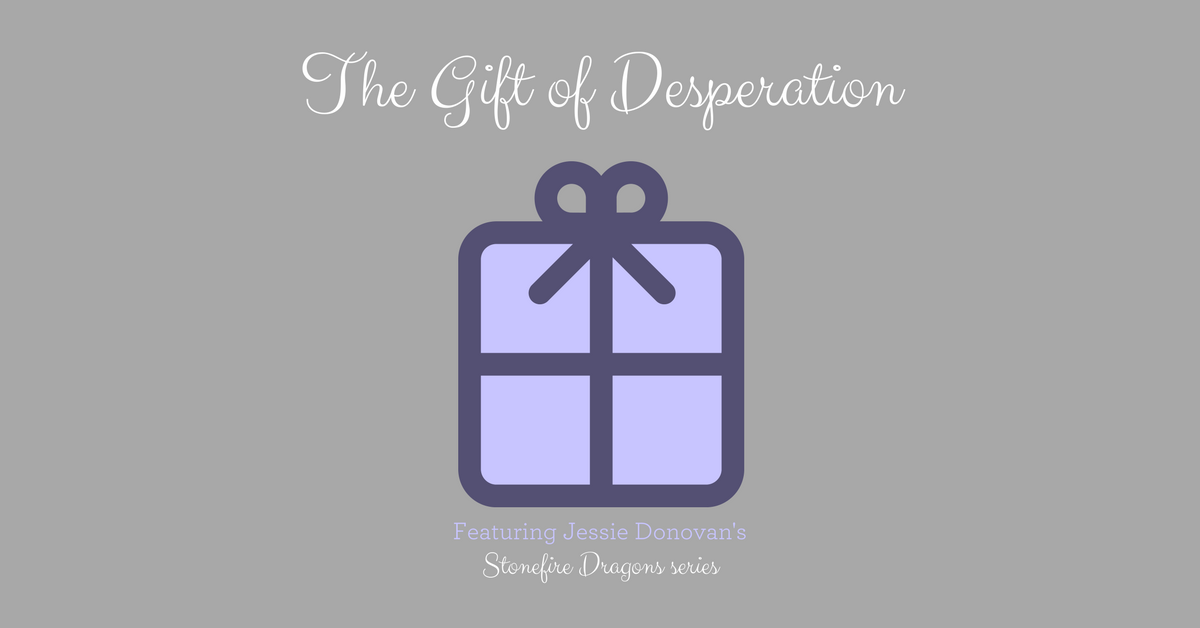We live in a world of spin. She who controls the story controls reality. The truth is no longer relevant, and any fantasy, provided enough of us believe, has been crowned as gospel. It seems that many of us think this is a new phenomenon, or at least greatly magnified in the current political, economic and societal milieu. It's not. Propaganda has been around since the dawn of time, and it's always been a fact that only winners write history. So I was very intrigued by the story arc running through Jessie Donovan's Stonefire British Dragons series. In the world of Jessie Donovan's dragons, humans don't think much of dragon shifters, and the humans control the flow of information. So the dragon shifters are feared, persecuted and tightly controlled in where they can live, who they can mate, and when and how they can interact with humans. But then one of the "approved" human mates decides to write a book shedding light on the mysterious dragon shifter culture and hopefully helping the humans to dispel fear with facts and embrace the dragon shifters as alien, but familiar at the same time, leading to less friction and more cooperation between species.
It's a good strategy, but it's not without its risks. In Revealing the Dragons, Jessie Donovan explores what happens when truth supplants speculation, and how different factions react, depending on what they have to gain or lose. Ms. Donovan imbues her dragon fantasy story with a great deal of truth.
In the book, lots of humans are eager to learn more about the exotic dragon shifters, and the book about them by the human mate, Melanie, is well received. But there are factions that have no interest in "humanizing" the dragon shifters, despite the fact that they spend most of their time in human form, and some of them are, actually, half human, with human mothers. Nor are the fear-mongers out there willing to be confused by the facts. They need monsters in order to lead the villagers in hatred and ignorance, and anything that threatens to negate the fear gets added to the list of that which is hated. So Melanie and her mate's clan become targets of hate and violence. Again, lots of truth here.
We live in a world without dragons (more's the pity), but we don't live in a world where this story line is unrealistic (an even greater pity). And while I try to keep this space apolitical, I can't help but comment that one of our presidential candidates could double for either Gaston (who was rejected by Beauty and led the villagers against the Beast in retaliation) or the village idiot, who's IQ may be impaired, but his ability to dredge up fear and hatred is unfortunately unlimited.
People who somnambulate through life will always be subject to fear and hate mongers. It's hard to wake up and take responsibility for our own lives. It's so much easier to blame others for our troubles. Hell, it's so much easier to raise ourselves up by standing on the backs of those we oppress than it is to do the hard work to stand tall on our own. Our fear keeps us passive and malleable and ripe for manipulation by those who have figured out that to the victors go the spoils. And those who seek to win, in the dragon shifter world as well as our own, learned a long time ago that creating a bullshit problem and then offering the solution is an excellent way to accrue power, money, influence and prestige.
So, in Ms. Donovan's dragon world, the dragons become the (nonexistent) problem and the dragon hunters become the saviors of the world. In our reality, the "Muslims" or the "Jews" or the "Blacks" or pick your favorite minority become the (equally nonexistent) problem, and only The Donald can save us. Yeah, right. It would be ludicrous if it wasn't so diarrhea inducing frightening. Seeing as I belong to one of the hated minorities and know from personal and cultural experience how damaging this worldview is, my guts are fairly watery right now.
But the antidote to mindless fear and ignorance is, as Ms. Donovan writes, information and familiarity. The more we know about each other, the more (reasonable people) learn to understand that there are more similarities between us than differences. And that even where there are differences, that's OK, because being different is good; our differences make life exciting and help us to learn and do new things and think about things from differing perspectives and maybe, in doing so, revolutionize the world, cure cancer, make contact with alien beings, end poverty. Or maybe just end racism, and homophobia or antisemitism or Pavlovian responses to terrorism that target peace loving, law abiding Muslims. Yeah, that would be nice. Oh, and, you know, treat dragon shifters fairly and with compassion, cause that's important too.




